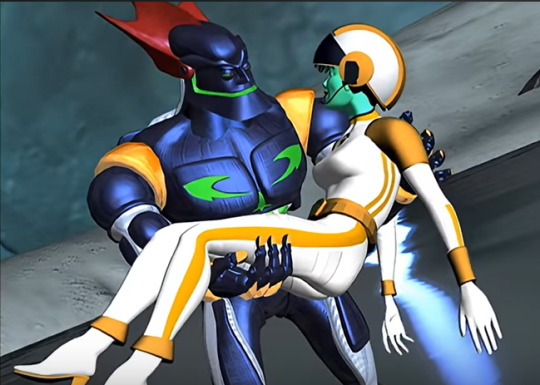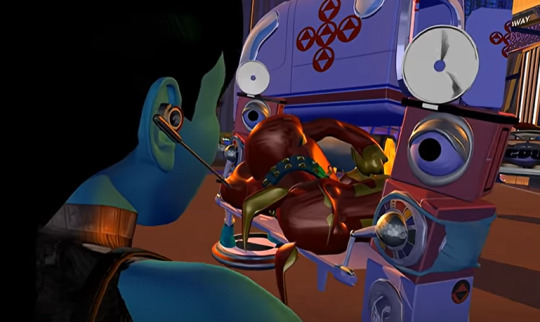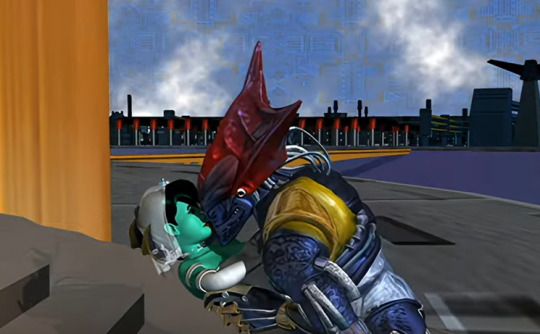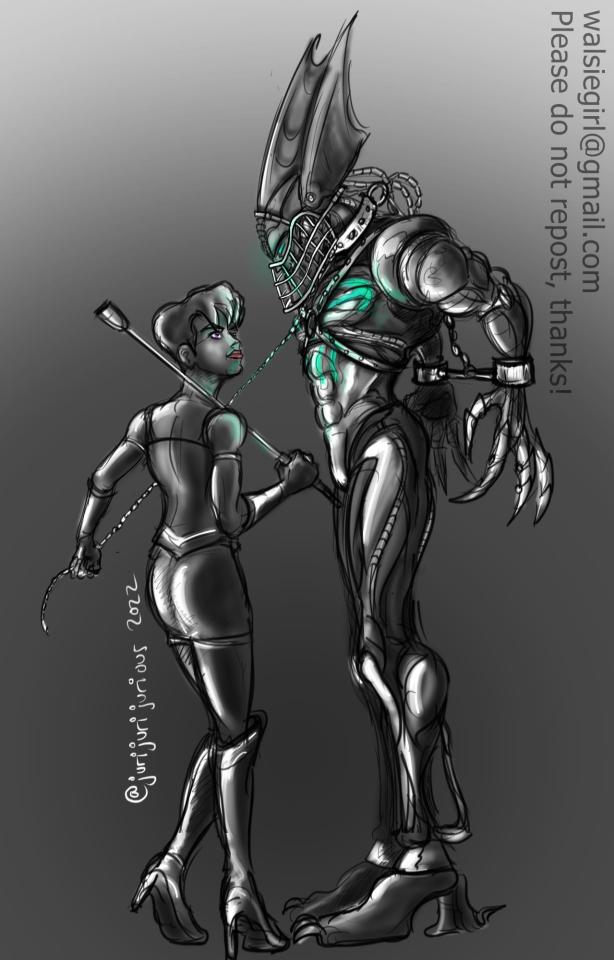#obsessed with how its 3 of the more... morally dubious characters in the series
Note
(Been re-watching Reboot, love your work.) Just have to say [dubious writing and/or Trojan abilities aside] that it really is both terrifying and disturbingly intimate how Megabyte is the cause of all of Dot's deepest emotional scars and yet also knows /exactly what she (thinks) she wants/ in a partner. Your thoughts?
Hi, sorry I took a few days to answer this, it's the kind of ask I like to mull over and smirk about. I apologise if I don't actually answer the question but I'll talk around it and see where it leads.
To start with, I think you've hit on the element of the series which is at the crux of my MegaDot fanfic and fanart - that ultimately Megabyte is highly perceptive about Dot's wants, and possibly even needs, and yet, in contrast, and in line with his nature, he knows, and at many times has infiltrated, her faults and weaknesses.

I will over-simplify things but bear with me...
The thing about Megabyte and Dot is that arguably, at a basic level, they are the same character. The parallels are I think particularly sharp in series one and again at the start of series 3, where they are at first competitive, astute and highly ambitious businessmen/women (series 1 - plus that nice lil scene in series 2 where Dot asks Megabyte to loan his ABCs - the fact she has him in her "phone book" always tickles me) OR later on, as the show develops and progresses, they are both sharp-minded strategists and commanders (series 3, where both characters are much darker and more ruthless).


If you strip away their morals, their appearance, their gender, etc, etc, and look at their basic motives and drives, whether that be in business and trade, or in war and conquest, you have the same mould. It's beautifully done; the same character framework but in totaly contrasting lights.
And because ReBoot was the elite in terms of 90's children's television in terms of its writing, depth and structure, these parallels are apparent in their relationship and actions. One of the best ones, which was pointed out by the blog @vidwindow years ago, is a subtle one which I honestly didn't pick up on at first (goes to show that this show has so many layers so that each re-watch is a revelation... but I digress):
In the first episode of series 3, "To Mend and Defend", Megabyte salvages Hex and with a wicked grin and that thick sinister tone of his, tells Herr Doktor "I want her to have the best treatment, understand? The best." Cue evil laugh. Later in the same episode, Frisket gets hurt in the zombie game and when they get out, Dot asks the doctors to make sure Frisket gets "the best treatment possible. The best". Heartfelt, caring and true.
The contrast is startling and it is meant to be - Megabyte rebuilding his sister for enslavement, no qualms about her pain or suffering, versus Dot saving her brother's dog and companion, who is as much a family member to her as any of the sprites she shares her life with. It shows the same thought pattern but cast alternately in selfishness and selflessness. So very nicely done. Same coin, different sides. Bravo, ReBoot creators.


So being so similar, understanding Dot for Megabyte isn't really a problem. Of course he knows what her weaknesses are, because in many ways they're his own. He might not always get it right, not only because she's as smart as he is and they thus outwit each other on occasions, but also because they're both short-sighted at times. They look too far ahead, or simply don't see the woods for the trees, overthink. This is where having someone like Bob works a treat for Dot's team because he is much more grounded in the simpler things in life and less structured. Megabyte doesn't have that counterbalance.
So why might he know, or think he knows, what she wants in a partner? Well he has seen her dallying with Bob for cycles, ever since he set foot in Mainframe probably. And he's had enough time to study Bob, his enemy, who he also must be a little bit obsessed with. (Because arch enemies are. There's sexual tension there too, no mistake.) So he might not 100% know Dot's deepest desires and needs, but he probably has a good understanding of what it is about Bob that Dot adores and thus what it is that attracts her to someone.
And yet we also know Megabyte sees them never quite commiting to each other for cycles. Why don't they commit? Both too busy, too bashful, full of imposter syndrome. I digress again...
We know Megabyte is astute, that he's observant. We even see this at the end of series one where he intentionally manipulates Dot's self belief for his own gains - he was preying on her weaknesses long before she walked down the aisle to him.

We can thus only assume that during his long tenure in Mainframe, where he's in constant conflict with Bob and Dot, that he has had chance to discern what it is that blocks the development of Bob and Dot's relationship. And we witness multiple times, throughout each of the RB series, those elements of Bob and Dot's characters which clash. The episode "The TIFF" is literally about this. ("The Medusa Bug" also has some nice moments where Enzo and Bob try to get Dot to take some time off.) Bob is wonderfully rash, he doesn't plan ahead, he's jovial and fun, he wears his heart on his sleeve; Dot is the opposite in many respects. Hence why they work so well together.
But if we fast forward to series four and Megabyte disguising himself as Bob, how can we not assume that in creating this performance, in plotting how he can persuade Dot to accept his charade of Bob over the real sprite, that he doesn't capitalise on his past knowledge and experience? That in trying to win Dot's heart he play his cards right, that he adjusts Bob's "character failings" so he can present a sprite who is more articulate, more organised, and more calculated. (And when I say "failings", they're not - just those minor characteristics that irk Dot at times when emotions run high). By adjusting himself to Dot's personal preferences, by impressing her by singing from her proverbial hymn sheet and fitting himself to her "values" - and at the same time having the appearance of the classic Bob with added wit and charm - he sells Dot what she wants under the guise of the person she has always wanted, but has perhaps found, in some respects... wanting?


(There's also the complicated issue of Dot's mental health playing a big part which I shan't even get started on, I'll never stop.)
In truth what Megabyte does is sell Dot "Megabyte-in-disguise", hidden beneath Bob's shell. That's all. He's not very much Bob at all when you really watch it.
Is that what she wants? Megabyte? No. His morals, his values - the sheer fact he has set up what is incontravertably and terrifyingly a rape plot - are all a complete anathema to her. And yet we are reminded that they are similar and that in those similarities there is an element of concordance, of mutuality, separated by stark morality. That they can appreciate one another and are alike one another. And it is in that sparse ground that I plant my fanfic seeds and make them germinate because, though the chance is slim, I can make that notion sprout roots. There is a twisted parallel universe where they could be together and, though they would never be a peaceful match of concordance and romance, that pair of control freaks would be electrifying; it would be a relationship which would be a constant battle of one-up-man-ship, of power, dominance and control. Get out the whips and chains, they're here for it. How can one not to tempted by the sordid notion of such a match? They wouldn't make love, they'd make fire, bitches.

And on that note: Like a firewaaaallll...
Thanks for the ask, I loved this. I I hope that's helped? I don't even know if it makes sense. If not I've at the least I've given you an insight into my brain. Stay frosty!
#reboot#juri got an ask#reboot fanart#reboot fanfic#inane rambles#megabyte#trojan megabyte#dot matrix#megadot#megabyte x dot#bob (reboot)#reboot cartoon#reboot tv show#control freaks
15 notes
·
View notes
Text
It hurts me to say this...
But Star Trek Discovery season 3 is a fucking mess. It's a mess that I am seriously struggling to be enthusiastic about watching. Its not the setting, its not the acting, its not even the characters really, although it is, but its because the writing has taken a tumble off the deep end. No one writing this show has an idea what they are doing. And none of them seem to give a shit.
Disco is struggling with something that was a problem in Picard too - there being too many characters and too many plot threads. This is something that was coming since the show decided not to have a conventional cast and have the command crew be non-main characters. However, it ends up with a severe epidemic of idiot ballitis.
The command structure of the Disco makes no sense, and it never has. But now it makes even less sense, and it gave up a great opportunity to fix it, to promote some people to main characters, to build an ensemble cast that didn’t feel disparate, to have that found family vibes. They did none of it. They did the same thing they do EVERY SEASON, which is introduce some new characters and bloat the cast further. There’s no time for characterisation, there’s no time for anything, we’ve got HUGE OVERWHELMING MYSTERIES TO SOLVE!!!
Some characters have lost their entire personality, thinking specifically of Stamets here, but also Tilly... and then who other than Michael and Saru are there who is an original character who got actual screentime and development? Georgiou’s gone now, Culber probably should have stayed dead lbr, and the whole bridge crew are attractive ascended extras. As usual, Disco does what it does badly, introducing YET MORE new characters to join the ranks of the underused (Book, who is baffled to be there other than to be sexy and handsome and have a good cat) or there to advance the plot at great expense (Adira, who is better than everyone despite being a literal child and its not being used to highlight how out of time the characters are. But we get so far, an A plot and 2 B plots detailing Adira's backstory, which boils down to 'Trills aren't supposed to be in human bodies whoops' aka, a plot TNG did far more efficiently 30 years ago. Oh and as of episode ten, just saying nothing)
I quipped in my post about the first episode that the plot was going to be climate change until they forget about it, but I didn’t expect it to happen so quickly. Instead, the plot seems to be THE BURN but also THE MUSIC but also THE FEDERATION MIGHT BE EVIL and now THE MIRROR UNIVERSE, but not the plot thread that was dangled by David Cronenberg about how the Terran empire fell after Spock gave them feelings, but a two parter of (enjoyable) overacting in old costumes that takes another 2 episodes away from THE BURN/THE MUSIC/THE FEDERATION and sets up a spinoff series that will likely actually be far better than it should be, because Disco isn’t allowed to be the flagship show, it must be the seed tray for the other ideas everyone would rather spend time on.
There are so many other things I have HATED this season (Gabrielle becoming a Romulan murder nun oh god the fLAMES ON THE SIDE OF MY FACE) but really the main, overriding, all consuming problem I have is with Saru. It’s such a good setup! Finally the captain, but obviously unprepared, with a crew who aren't cohesive, are traumatised, and a computer that somehow has a personality. He throws a dinner that ends badly. He takes the advice of a sentient computer and scores a win. Even though control happened 5 minutes ago, he is fine with this. Even though he has always had problems with fear and then now the absence of it, he now absolutely has no qualms about any of this.
They're stranded in the future and need to find Starfleet, but it takes about a week and then they do. The starfleet of the future is kinda mean and very overstretched, but they have the solution to their problems! Future Starfleet is breaking a thousand laws and they’re now a dirty secret...so they future up the disco, but don’t give them new uniforms or use them, or seize their dilithium for their ships, nah, they just....do nothing.
He appoints Burnham as his 2IC, who then immediately soft mutinies against him so he fires her. He then appoints a 23 year old ensign (Burnham's best friend, protege and literal roommate) as his 2IC. No one has a problem with this. LITERALLY NO ONE HAS A PROBLEM WITH THIS. Not Stamets. Not Burnham. Not Detmer. Not anyone. Including, somehow, the future starfleet admiral?? Was I the only one who watched the 5 or so TNG/DS9 episodes where they hammered home the 'Being a captain takes a lot of experience' peg, into the 'prodigies are bad' hole??? SEE: Red Squad, Valiant, Wesley fucking Crusher???
So you've got an unprepared rookie captain, who by his own original character arc never got the captain training he wanted. He got a year being 2IC to Lorca, then a year of being co-captain with Pike, during which he went through a significant trauma and he and Pike weren’t exactly sharing captaining tips by the fire. He's visibly, obviously struggling...apart from the show doesn't think so. The writing doesn't think so. Am I supposed to be having a sense of dread about this? Have they all been possessed by brain worms? The ones that are the cousins of the Trill in the beta canon novels perhaps??? (drink)
He’s now obsessed with some dead Kelpien scientist even though admiral underused says that as far as he knows Kelpia is fine and a member of the federation, but instead of having an episode where Saru gets them to jump there, he just does...other dodgy, stupid, bullshit that feels incoherent, feels wrong, but no one but me seems to care. The writers don’t.
Just, when Lorca was our morally dubious captain, we were supposed to think there was something hinky because the other characters responded to him. Saru hated him. Stamets hated him. Culber hated him. Cornwall was aghast at him. We're ten episodes into this season and we're in the past in the mirror universe I assumed at the behest of a Q but is actually some TOS proto-Q bullshit and I am JUST VERY TIRED AND ANGRY THAT THIS IS ALL HAPPENING.
The first episode of this season was SO STRONG. There were some GREAT ideas. Since then, Disco has become what its critics have said it was and it breaks my fucking heart.
#star trek discovery#star trek disco s3#star trek disco#this rant has been building for weeks#I still have a lot of feelings#but the plotting of this show is so lazy in the worst way
24 notes
·
View notes
Text
https://www.bloomberg.com/news/articles/2019-10-02/trump-s-impeachment-saga-stems-from-a-political-hit-job-gone-bad
Joshua Green's new @BW piece: Trump's impeachment saga stems from a right-wing hit job gone bad -- an anti-Biden project funded with Mercer family money that Trump and Giuliani hijacked, only to have it blow up on them: https://t.co/mw9TuUCr87
Trump’s Impeachment Saga Stems From a Political Hit Job Gone Bad
The president's obsession with finding dirt on Biden goes back to Steve Bannon and Clinton Cash.
By Joshua Green | Published October 2, 2019 | Bloomberg | Posted October 3, 2019 10:20 AM ET |
The irony of President Trump’s sudden impeachment peril is that it’s the unintended result of an effort to help him: a political hit job aimed at a likely opponent (Joe Biden) and funded by a major right-wing donor (Rebekah Mercer) that Trump and his lawyer (Rudy Giuliani) impatiently hijacked, with consequences that could turn out to be disastrous for them.
To understand how Trump wound up the target of a House impeachment inquiry, it’s first necessary to understand why he was so obsessed with finding dirt on Biden that he pressured Ukraine’s president in a July 25th phone call to “do us a favor” and investigate Biden and his son, Hunter. The notion that Hunter Biden and his father could be complicit in Ukrainian corruption was first aired in a 2018 book, Secret Empires: How the American Political Class Hides Corruption and Enriches Family and Friends, by conservative author Peter Schweizer. The book and its author had a purpose and a lineage.
Schweizer, an editor at Breitbart News, is the president of the Government Accountability Institute (GAI), a nonprofit group whose board chairwoman and major donor is Rebekah Mercer, a prominent Trump supporter and benefactor of right-wing causes.
In a book I wrote about Trump and Steve Bannon, I described how Schweizer and Bannon, GAI’s founding chairman, deployed a staff of lawyers, investigators, and forensic data scientists to scour public records, corporate filings, and the dark web to compile damning evidence that Hillary and Bill Clinton behaved unethically by associating with unsavory, favor-seeking foreign donors through their work with the Clinton Foundation. Bannon, the project’s mastermind, had a specific goal in mind. He wasn’t interested in firing up conservatives, who already despised the Clintons. He wanted GAI’s findings presented in non-partisan fashion to independents and Democrats who were considering supporting Hillary Clinton’s 2016 presidential bid. In May 2015, on the eve of her campaign launch, Schweizer published GAI’s findings in a book, Clinton Cash: The Untold Story of How and Why Foreign Governments and Businesses Helped Make Bill and Hillary Rich. It instantly became a New York Times bestseller.
Because the book documented a series of ethically dubious actions—unreported foreign gifts, Bill’s dinner with Kazakhstan’s autocratic president on behalf of a donor seeking lucrative mining rights—the mainstream media took up and amplified its investigations into the Clintons. As Bannon had intended, the whiff of corruption attached itself to Hillary and became a major theme of the media’s coverage, poisoning her image. “They’ve enriched themselves while playing up the worst cast of characters in the world,” Bannon argued of the Clintons at the time. Material from GAI even showed up on the front page of the New York Times. “Looking at it from their point of view,” the liberal strategist David Brock told me of Schweizer and GAI, “the Times is the perfect host body for the virus.”
Clinton’s subsequent loss in the 2016 election was proof of concept: You could spot a Democratic frontrunner years out and tarnish that person badly enough to ruin their candidacy.
So Schweizer and GAI sought to repeat the trick. Looking ahead to 2020, it wasn’t hard to foresee that a moderate, two-term vice president like Joe Biden, popular across the party, was likely to run for president and be a good bet to win. Nor was it difficult for GAI to turn up examples of ethically questionable behavior by Biden’s family members and publish the information in Secret Empires.
In 2014, while his father was vice president, Hunter became a highly paid director of Burisma, a Ukrainian natural gas company, despite lacking expertise in resource extraction, Eastern European energy concerns, or Ukrainian regulatory affairs. The year before, after flying to China with his father aboard Air Force Two, Hunter Biden joined the board of an investment fund, BHR Partners, co-founded by a Chinese private-equity investor trying to raise $1.5 billion. To all appearances, Hunter Biden was cashing in on the family name in way that’s common among political families in both parties. (In this 2015 Bloomberg Businessweek piece, for example, I explained how Jeb Bush leveraged his famous surname to fund private equity deals with Chinese investors.)
As with Clinton Cash, Schweizer didn’t allege in his book on the Bidens that any laws were broken. Instead, his reporting laid out a suggestive timeline that led readers to the inescapable conclusion that what had transpired reeked of influence-peddling and moral, if not legal, corruption—the sort of self-dealing voters despise. While Ukraine’s prosecutor general told Bloomberg News he found no evidence of wrongdoing, the facts surrounding Hunter Biden’s foreign business dealings prompted the mainstream media, including the New York Times, to take notice.
But Secret Empires didn’t have anything like the effect on Biden that Schweizer’s last book had on Clinton—it pretty much came and went. When I spoke to Schweizer last week, he offered several reasons why the book kind of came and went: one, it didn’t focus solely on Biden, but included other politicians. “That probably affected the vectoring of the narrative,” he speculated. It also appeared well before Biden entered the race, he noted, depriving it of “the urgency of the campaign” to drive it into the news cycle. Another factor, which he didn’t mention, is that the primary bad actor in Schweizer’s tale isn’t Joe Biden, but his son, who isn’t running for president.
Rather than the wall-to-wall cable news coverage his Clinton book produced, the impact of Secret Empires landed almost exclusively in conservative media, much to the frustration of Bannon, who griped about it at the time.
This is important for two reasons. First, the political effectiveness of projects like Clinton Cash and Secret Empires rests on their ability to enter the public’s consciousness as something other than “conservative attacks.” The information needs to be legitimized—or “weaponized,” to use Bannon’s term—through the mainstream press. This requires patience, restraint, and enough sophistication to understand why a damaging story published on the front page of the New York Times has infinitely more political utility for conservative partisans than the same story appearing on Breitbart.com. As a GAI staffer explained to me in 2015, “We don’t look at the mainstream media as enemies because we don’t want our work to be trapped in the conservative ecosystem.”
By this past spring, it was clear the Biden attack was stuck in the conservative ecosystem. And here’s where Trump enters the story—and inadvertently kicks off the whole impeachment saga: Trump may be the single most devoted consumer of conservative media, absorbing hours of it each day. He was mainlining the Biden coverage as part of his daily media diet.
We know from his Twitter feed and frequent outbursts that Trump isn’t patient, doesn’t restrain himself from trying to dictate press coverage, and repeats—and often exaggerates—what he hears in right-wing media. (Helpfully, he also name-checks his sources, including Schweizer.) His former Homeland Security adviser Thomas Bossert confessed over the weekend to being “deeply disturbed” that Trump couldn’t distinguish truth from fiction, choosing to believe a debunked conspiracy theory that Ukraine, not Russia, interfered in the 2016 election.
What differentiates Trump from other power-consumers of conservative media is that he’s the president and was willing to use his governmental powers to attack a political rival. Impatient to advance a story he believed would damage Biden, Trump tapped Giuliani, who told the New York Times in May that he was going to Kiev, the Ukrainian capital, to push the new government to investigate the Bidens. “That information will be very, very helpful to my client,” he said. (He later canceled the trip.) He told CNN that “a well-regarded investigator” had brought Hunter Biden’s story to his attention.
Schweizer says it wasn’t him. “I don’t know Rudy and I’ve had no contact with Trump or the White House,” he told me. “I know there was a lot swirling around Ukraine, but I was as surprised as everyone” to learn that Trump delayed military aid to Ukraine and called Ukrainian president Volodymyr Zelenskiy about Biden.
Last week, the White House released a rough transcript of the call, along with a whistleblower’s report, confirming that Trump pressured a foreign government to help him discredit his rival. On the same day the transcript became public—even as Republicans began to recognize the danger it poses to his presidency—Trump was still trying to force the Biden story into the news by misconstruing and exaggerating one of Schweizer’s central claims in Secret Empires. Trump told reporters: “When Biden’s son walks out of China with $1.5 billion in a fund and the biggest funds in the world can’t get money out of China and he’s there with one quick meeting and he flies in on Air Force Two, I think that’s a horrible thing.” (In a statement, a lawyer for Biden called this a “gross misrepresentation” and said “Mr. Biden has not received any return or compensation on account of this investment or his position on the board of directors.”)
The collective effort to impugn Biden doesn’t appear to have sent him into a tailspin, at least not yet. A new Politico/Morning Consult poll this morning finds that 40% of likely Democratic voters think Biden has the best shot of beating Trump, up one point from the last poll.
But there’s no question the anti-Biden effort has boomeranged on Trump, who is suddenly under siege from the Democrats’ fast-moving impeachment inquiry. Giuliani has been subpoenaed by House investigators. So has Secretary of State Mike Pompeo, who admitted this morning he was on Trump’s call with Zelenskiy. Kurt Volker, the former special envoy to Ukraine who quit on Friday, will testify in the House impeachment inquiry on Thursday, while Marie Yovanovitch, the former U.S. ambassador to Ukraine who was abruptly ousted in May, will sit for a joint House deposition next week.
At this point, no one can say what effect all this will have on the 2020 election. But it looks increasingly like it won’t be the one that Biden’s antagonists, from Trump to Schweizer, were aiming for.
#trumpism#trump administration#president donald trump#trump scandals#donald trump jr#ivanka trump#impeach trump#donald trump#trump news#trump crime family#trump crime syndicate#trump cult#trump corruption#rudy giuliani#2020 presidential election#2020 candidates#2020 election#joe biden#impeachment inquiry now#impeachthemf#impeachtrump#politics and government#us politics#politics#u.s. news#u.s. presidential elections#u.s. department of justice#state department#u.s. foreign policy#ukrainegate
0 notes
Text
This Month’s Reads: January
In an effort to remember more of what I read, I’ve decided to track properly this year and record my thoughts in brief. Thus, here are This Month’s Reads.
highlights: I’ll Be Gone in the Dark, The Ghost Bride, They Both Die at the End, and a lot of comics

[image description: the covers for the books listed below]
Heart of Gold vol 1 (Eli Baum & Viv Tanner)
Dunant is a faith healer. Ionel is a pianist losing his sight. Every week Ionel attends Mass hoping to be cured, but Dunant turns him away. Meanwhile, a series of strange deaths casts a shadow over this gorgeously illustrated tale.
While not much especially romantic occurs, our two leads are clearly leaning on the edge of something. Ionel is intrigued by the priest, both due to his own needs and Dunant’s lonely aura. Dunant confesses his innermost doubts to Ionel inadvertently, leading to some interesting discussions of faith. Those discussions and the art’s tender beauty were the highlights for me. The pacing was slow for my tastes and some scenes felt like they could’ve been edited or cut to avoid repetition.
*
I Hear the Sunspot vol 1-3 (Yuki Fumino, translator: Stephen Kohler)/
A brash college student named Taichi meets fellow student Kouhei by chance. Kouhei’s good looks attract attention, but he feels isolated due to his hearing loss. Taichi begins taking notes for Kouhei in exchange for lunch and a slow burn romance ensues.
This is one of my favorite manga from recent years, so I always reread the previous volumes when a new one comes out. Truly, the series improves with each volume. With the expanding cast, the mangaka explores different perspectives on and experiences with deafness. Volume 3 introduces Ryu, who is Deaf and lives life quite happily without hearing-- in contrast to Kouhei, who fears losing his remaining hearing.

[image description: the covers for the books listed below]
Little Women (Louisa May Alcott)
I read Little Women for the first time during a young adult literature class in college. I must confess that I remembered very little of the plot, so reading it again was like starting entirely new. I forgot how funny it can be! The moral lessons for the most part still apply today, though I disagreed somewhat with a few of them.
The most intriguing and frustrating thing for me is Jo March, who reads to me as very much queer, though what flavor is debatable. My personal interpretation (and I’ll admit that I’m projecting) is that Jo is transmasculine and somewhere on the ace spectrum. And, personally, I believe the author was some flavor of queer as well.
*
Only the Ring Finger Knows (Satoru Kannagi & Hotaru Odagiri, translator: Sachiko Sato)
This month’s BL LookBack!
*
Versailles of the Dead vol 1 (Kumiko Suekane, translator: Jocelyne Allen)
I know very little about French history, so I have no idea how faithful this tale is to actual events. However, I don’t think the actual Marie Antoinette was her twin brother, possibly possessed by a demon. Likewise, I’m quite certain there were no zombies rampaging France.
Usually zombie stories and historical dramas don’t interest me. But I have a weakness for crossdressing plots, despite them usually being problematic. Surprisingly, this registered fairly low on the problematic scale-- so far. And while I wasn’t exactly riveted, it was compelling enough to persuade me to preorder the second volume. I hope this receives an anime adaptation because it could be quite spooky under the right director.
*
Coyote vol 1 (Ranmaru Zariya, translator: Christine Dashiell)
It took me several attempts to finish this BL because the first chapter put me off. As expected of “werewolf in heat” erotica, there’s some dubious consent issues. However, once I finally got past that first chapter, the dramatic plot lured me in.
Werewolves are half-forgotten by the general populace, but certain groups still hold a grudge against them-- including the Galland mafia family, which our human lead “Marleen” is set to take over soon despite personally having no issue with werewolves. Meanwhile, our werewolf lead Coyote accepts a job to kill the Galland heir, not realizing it’s the very man he’s fallen in love with. Overall, the story has its fair share of objectionable issues, but I’m compelled enough to keep reading for now.

[image description: the covers for the books listed below]
I’ll Be Gone in the Dark: One Woman's Obsessive Search for the Golden State Killer (Michelle McNamara)
I think that if a person were going to only read one true crime book ever, this one would be a good pick. The actual true crime element of the book is great. The writer excels at bringing the people to life-- the victims, the cops, the witnesses, even the unknown killer. She has a real knack for adding just enough evocative detail to paint a picture without sensationalizing.
However, what I find most compelling is how thoughtfully she examines her own motivations and actions-- and thus those of the reader as well. What is it about true crime that attracts people? And how can we pick apart these real life tragedies while respecting human life?
*
The Prince and the Dressmaker (Jen Wang)
Frances is a seamstress working hard for a pittance and dreaming of grander things. Her designs catch the attention of Prince Sebastian, who is in need of both a dressmaker and a secretkeeper. The two become friends, often making a splash around town with Sebastian dressed up as the glamorous Lady Crystallia. However, some secrets can’t be kept forever.
This comic has been on my to-read list for a while based solely on the cute cover and title. It was indeed cute (I especially loved the comedic off-model panels) but the story went deeper and was more rewarding than I anticipated. However, content warning for a character being outed in a humiliating manner; it’s more intense than you might expect for comic like this.
*
Life Outside the Circle (H-P Lehkonen)
Artist Sami leaves big city Helsinki for remote, rural Finland. There he meets his new neighbor Juha and Juha’s young daughter Maiju. Culture shock and romance ensues.
I had the good fortune to meet the cartoonist at TCAF 2018. I enjoyed the book I picked up from him there, as well as the queer Finnish comics panel he moderated. So I figured I’d check out more of his work and he didn’t disappoint-- this comic had plenty of genuine humor, heart-warming moments, and realistic angst. I especially appreciate the blasé approach to Sami being transgender; it’s just one of his traits and while it does influence some things in the story, overall it’s not that important.
*
The Ghost Bride (Yangsze Choo)
An early contender for favorite book of 2019 appears! This book has it all: romance, spooky thrills, adventures in other realms, wit, plenty of food, and an upcoming Netflix miniseries!
Our hero is Li Lan, who has attracted the unwanted romantic attention of local rich boy Lim Tian Ching. Not only is he rude and selfish, he’s also dead! As Li Lan struggles to ward off Lim Tian Ching’s invasive spirit, she becomes more and more drawn into the world of the ghosts-- as well as the secrets of the Lim family and her own. I loved all the rich detail, both for the real life historical setting and the fantasy settings. Highly recommended and I’m very excited for the TV series as well.

[image description: the covers for the books listed below]
Monthly Girls’ Nozaki-kun vol 10 (Izumi Tsubaki, translator: Leighann Harvey)
Another volume of Nozaki-kun, another plea from me for another season of the anime, please! Not to say that the manga isn’t good-- it’s great-- but this is a case of the anime being better, in my opinion.
Anyway, the rom-com misadventures of Nozaki, Chiyo, and the crew continues. Relationship development continues to be slow, which is no issue for me since that’s hardly what I’m reading for. (That said, Kashima and Hori seem like they might be on the verge of becoming a couple? Maybe?) Since I read Nozaki as aroace, I’m pleased to report that he remains as aroace-seeming as ever. Poor Chiyo, however, is crushing on him harder than before, to the extent that it’s starting to become kind of creepy.
*
The Other Dress (Emmy Engberts)
This month’s transreading!
*
They Both Die at the End (Adam Silvera)
I’m well aware that I’m in the minority here, but I actually enjoy reading major character death when it’s done well. “Enjoy” might be the wrong word; what I mean to say is that I appreciate the experience of being moved so powerfully by a work of fiction.
My main concern going into They Both Die at the End was that the deaths would feel cheap. After we get to know the main characters (who are young and healthy) so well and they’ve been through so much together, what kind of death could possibly feel authentic and “worth it” to the reader? I won’t spoil the end for anyone, but I thought the author came through strongly. Thoughtful and emotional with intriguing world building.
0 notes